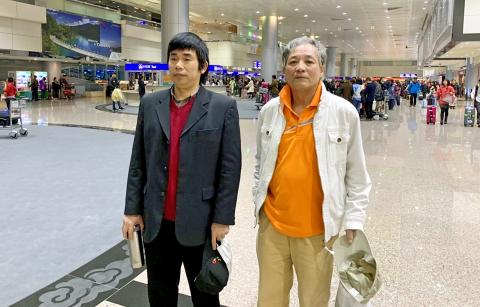Two Chinese asylum seekers who have been stuck at Taiwan Taoyuan International Airport for four months were allowed to enter Taiwan late on Wednesday.
Yan Kefen (顏克芬), 44, and Liu Xinglian (劉興聯), 64, entered Taiwan on the basis of “professional exchanges,” after they earlier that day exited the country by flying to an undisclosed location.
They were then picked up at the airport by friends and taken separately to prearranged accommodation. They now hope that the US or Canada will grant them asylum.

Photo: Tony Yao, Taipei Times
Yan and Liu on Sept. 27 last year arrived at the airport on a flight from Thailand and were scheduled to continue to Beijing, but did not get on the outbound flight.
They submitted a request for asylum on the grounds of political persecution in China, but could not provide any supporting evidence, the Mainland Affairs Council said.
The two were confined to a fourth-floor room at the airport.
Yan told the Central News Agency that life in the airport was “alright,” although he complained of stress and chest pain, as there was not enough room to move around.
“I haven’t slept in a real bed for a long time,” he said.
On Thursday last week, the council said that they could enter Taiwan on the basis of “professional exchanges” until they are granted asylum in a third nation, but would first have to exit and re-enter.
New School for Democracy board member Tseng Chien-yuan (曾建元) on Friday last week said that he was willing to act as guarantor for the two asylum seekers and that his decision was based solely on human rights considerations.

CHAOS: Iranians took to the streets playing celebratory music after reports of Khamenei’s death on Saturday, while mourners also gathered in Tehran yesterday Iranian Supreme Leader Ayatollah Ali Khamenei was killed in a major attack on Iran launched by Israel and the US, throwing the future of the Islamic republic into doubt and raising the risk of regional instability. Iranian state television and the state-run IRNA news agency announced the 86-year-old’s death early yesterday. US President Donald Trump said it gave Iranians their “greatest chance” to “take back” their country. The announcements came after a joint US and Israeli aerial bombardment that targeted Iranian military and governmental sites. Trump said the “heavy and pinpoint bombing” would continue through the week or as long

TRUST: The KMT said it respected the US’ timing and considerations, and hoped it would continue to honor its commitments to helping Taiwan bolster its defenses and deterrence US President Donald Trump is delaying a multibillion-dollar arms sale to Taiwan to ensure his visit to Beijing is successful, a New York Times report said. The weapons sales package has stalled in the US Department of State, the report said, citing US officials it did not identify. The White House has told agencies not to push forward ahead of Trump’s meeting with Chinese President Xi Jinping (習近平), it said. The two last month held a phone call to discuss trade and geopolitical flashpoints ahead of the summit. Xi raised the Taiwan issue and urged the US to handle arms sales to

BIG SPENDERS: Foreign investors bought the most Taiwan equities since 2005, signaling confidence that an AI boom would continue to benefit chipmakers Taiwan Semiconductor Manufacturing Co’s (TSMC, 台積電) market capitalization swelled to US$2 trillion for the first time following a 4.25 percent rally in its American depositary receipts (ADR) overnight, putting the world’s biggest contract chipmaker sixth on the list of the world’s biggest companies by market capitalization, just behind Amazon.com Inc. The site CompaniesMarketcap.com ranked TSMC ahead of Saudi Aramco and Meta Platforms Inc. The Taiwanese company’s ADRs on Tuesday surged to US$385.75 on the New York Stock Exchange, as strong demand for artificial intelligence (AI) applications led to chip supply constraints and boost revenue growth to record-breaking levels. Each TSMC ADR represents

State-run CPC Corp, Taiwan (CPC, 台灣中油) yesterday said that it had confirmed on Saturday night with its liquefied natural gas (LNG) and crude oil suppliers that shipments are proceeding as scheduled and that domestic supplies remain unaffected. The CPC yesterday announced the gasoline and diesel prices will rise by NT$0.2 and NT$0.4 per liter, respectively, starting Monday, citing Middle East tensions and blizzards in the eastern United States. CPC also iterated it has been reducing the proportion of crude oil imports from the Middle East and diversifying its supply sources in the past few years in response to geopolitical risks, expanding